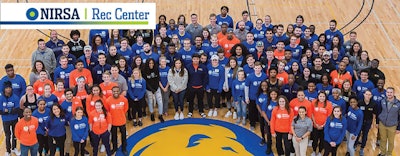
In May, as state legislatures around the country were advancing bills regarding the participation of transgender individuals in organized sports, NIRSA issued a statement declaring the association's support of transgender athletes.
"We believe inclusive access to sport is an important part of building healthy people and healthy communities," reads the statement, which was cosigned by seven other organizations as diverse as the American College Health Association and the Association of College Unions International. "Inclusive access must include people of all gender identities."
That guiding principle was behind the transgender play policy established six years ago by the NIRSA Championship Series — a recreational sports program that hosts national tournaments in four sports and has long been dedicated to providing an environment of inclusive competition and sporting behavior. (More on terminology later.)
For years, NIRSA sports tournaments have been at the forefront of social change for the association, and "NIRSA's statement affirmed the bold trajectory we'd launched into at the Series," says Ashley Lax, chair of the NIRSA Championship Series and assistant director of sport programs for Recreation and Wellbeing at the University of Wisconsin-Madison. "It reinforced that while we may have been navigating uncharted territories on some of our initiatives, we continue to be guided by the core values of our profession. We had not updated our policy since it was initially instituted back in 2015."
After nearly a year of focused volunteer efforts, however, that is expected to change soon. By the time the fall 2021 season of the NIRSA Championship Series kicks off, a new transgender play policy is expected to be in place — one that does not require an individual to prove they are the gender they say they are. And tournament staff will have the benefit of social justice training before the first whistle blows at every Series event.
"We don't necessarily need to know when a student identifies as trans," Lax says. "Instead, we need to make sure that all of our policies and all of our environments are ready to support trans athletes when they participate in Series events."
Updating the transgender play policy is one of the first responsibilities of the 10-member Social Justice Task Force, which was appointed last September by the NIRSA Championship Series to assess its current advocacy and antiracism efforts.
"This year, we're continuing to focus on education," says Jasmine Holmes, chair of the task force and the associate director of sports programs at the Barnes Center at The Arch at Syracuse University. "One of the ways we're hoping to do that is by providing mandatory social justice education for all volunteers who work with the Championship Series. That way, when they go out and interact with people who don't necessarily look like them or with whom they don't share common identities — whether visible or invisible — they feel comfortable having conversations about what we do and why it's important to be as inclusive as possible. That starts with leadership, and we need to make sure we're living the example."
'A new foundation'
Campuses around the country already are living the example, to a certain extent. Holmes notes that some intramural programs have removed all gender-based leagues, organizing them instead by competitive skill levels to accommodate nonbinary individuals. Other programs also now allow participants to wear necklaces and bracelets related to their culture or religious beliefs, rather than remove them; the pieces of jewelry simply need to be tightened or taped down so they don't pose a safety risk to their wearers or others.
"We need to lay a new foundation," Holmes says. "There are policies that have been in existence — not only within the Championship Series but within NIRSA — for a long time that have not been a great representation of who our stakeholders are. I think the work that we're doing with the Social Justice Task Force is going to better serve all of our members and allow people who have been systemically left out, or pushed out, a way to get more involved within our organization."
The task force has even developed a guiding statement and rubric to help the 11 Series work teams that make programming and staffing decisions do so through lenses of diversity, inclusion and equity, with an eye toward social justice.
In addition to updating the Championship Series transgender play policy and supporting the education of volunteer staff, another of the task force's early responsibilities involves replacing the term "sportsmanship."
"The fact that the word has 'man' right in the middle of it? Not necessarily the most inclusive," Lax says. "If the name of our sportsmanship policy is a little outdated, how outdated is our sportsmanship policy in general? The task force is taking a look at the Championship Series policy, just to see if there are any updates or changes that need to be made — beyond just the name itself."
"Unfortunately, there's not an easy way to just find another term, but 'sporting behavior' seems to be the frontrunner," Holmes says. "We're really making sure that we remove the idea of a binary system — or a traditionally male system — to include more participants who don't identify as such and make sure our sporting behavior is reflective of who we want participating in our programs."
How will participants in the NIRSA Championship Series respond to these changes and others spearheaded by the Social Justice Task Force? That remains to be seen, but the task force will be actively connecting through NIRSA's Ideas in Motion series and other avenues to provide space for ongoing conversation about how policies and initiatives are affecting the work.
"Any time you talk about social justice and the intersection of beliefs, someone is not going to be happy and may feel like their rights have been trampled," Lax admits. "Overall, though, I think a lot of our participants are either going to notice and appreciate the changes, or not notice anything at all. Our goal is to make sure we are rolling out the safest and most inclusive, most universal programming, and I hope that these changes will only enhance their experience."
'The green light'
After a one-year hiatus because of the coronavirus pandemic, NIRSA Championship Series competitions will return for the 2021-22 academic year. Soccer and flag football are scheduled for fall, followed by basketball and then tennis.
As the Series gets off to a fresh start in multiple ways, Lax credits NIRSA leadership for responding to the call for social justice and making progressive statements on gender, race and other significant issues. Task force members brought a social justice lens to their review of the language used in the 20th edition of the NIRSA Flag & Touch Football Rules Book and Officials' Manual before it was updated for the 2021-22 season, and they hope to introduce a short "expectations" guidebook for host sites and tournament staff. Collectively, the actions demonstrate ways in which sport can be a vehicle for social change — no matter how big or small.
"We are ambitious, and I think we have a little more flexibility than other organized sports groups when it comes to making changes and staying current," Lax says. "If we didn't have the support from the top to make changes and pivot with trends, that would make it a lot more difficult to do any of these things. NIRSA, taking the stances it does as an organization, gives us — as the Series — the green light to explore what it truly means to be antiracist and inclusive when it comes to sport."
This article originally appeared in the September 2021 issue of Athletic Business with the title "How Rec Sports Can Be a Vehicle for Social Change " Athletic Business is a free magazine for professionals in the athletic, fitness and recreation industry. Click here to subscribe.





































